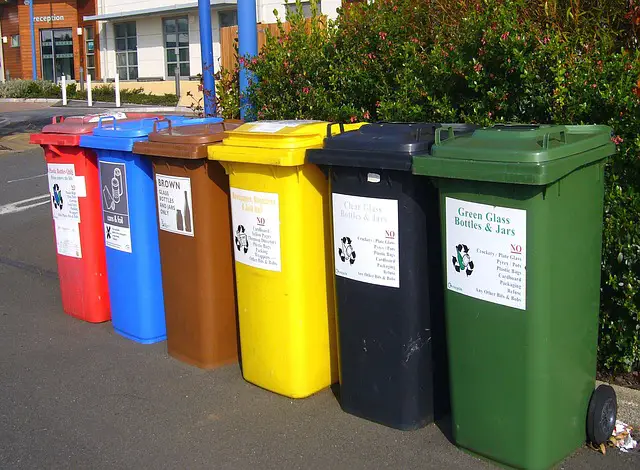Recycling is one of the main waste management options across society, and it has it’s own list of potential pros and cons compared to the other waste management options.
In the guide below, we consider whether recycling might be worth it or not, according to different factors.
Summary – Is Recycling Worth It, Or A Waste Of Time?
In some instances recycling might be worth it, and in other instances it might not be.
The answer to the question might depend on what factors are being taken into account.
Economics
We previously wrote about the profitability and economic viability of recycling in this guide.
There’s a range of economic factors to take into account when assessing whether recycling is worth it from an economic perspective.
Environmental
We previously wrote about the potential environmental impact of recycling in this guide.
There’s several environmental factors to take into account when assessing whether recycling is worth it from an environmental perspective.
Resource Management
Separate to environmental considerations, resource management is a consideration in itself when assessing whether recycling is worth it.
Practical
From a practical perspective, there’s a few major factors to consider when assessing whether recycling is worth it.
Recycling vs Other Waste Management Options
We’ve put together a comparison guide of recycling vs the other major waste management options in society.
Best Way To Manage Waste Across Society
Other than the main waste management options, there may be other ways to address the management of waste across society.
Overall, recycling can be worth it, and can form part of a good waste management plan for a city, depending on the different factors.
Is Recycling Worth It From An Economic Perspective?
There’s ultimately a range of economic factors to take into account when assessing the economic feasibility of recycling.
One of the major economic factors to take into account might be the profitability of recycling.
The profitability of recycling can be dependent on a range of factors, but the value of the material being recycled, and the market demand for that material can be important factors.
Metals are an example of a material with a higher than average global recycling rate, and this is in part due to the value of some metals as a recycled material, and the market for recycled metals.
On the other hand, some plastics have a lower recycling rate, and this is partially due to the lower value of some recycled plastics, and the economics of making new plastic vs recycling plastic.
So, it might be accurate to say that some materials are worth recycling from an economic perspective if the recycled materials have value, there is a demand for the recycled material, and the economics of recycling the material vs producing it new favor recycling.
Just as one example, the efficiency of recycling a material or product can impact economics of recycling.
Is Recycling Worth It From An Environmental Perspective?
For example, for some materials such as some metals, recycling these metals may lead to an energy saving, and a subsequently lower carbon emissions footprint compared to producing that metal from virgin materials.
The same may be true for glass.
On the other hand, recycling still has a recycling chain to consider, and recycling uses fuel for transporting recycled materials, energy, water (for cleaning materials), and has an emissions footprint.
This environmental footprint would have to be considered for each recycled material.
Is Recycling Worth It From A Resource Management Perspective?
Resource management refers to resource abundance and resource scarcity (or resource depletion).
Recycling may be worth it for some materials that come from resources and raw materials that are either non renewable, or are more scarce than others.
An example of a type of resource that might be more scarce than others might be some precious metals, and therefore it might make more sense to try to recover and recycle some metals.
Is Recycling Worth It From A Practical Perspective?
There are many practical considerations for recycling.
Just a few examples include:
– Whether the waste is actually recyclable or not e.g. some plastics are recyclable, whilst others aren’t. The design of the product that is being recycled can also impact how easy it is to recycle specific materials used to make the product
– Some waste can only be recycled a limited number of times, and will eventually end up being downcycled, or sent to landfill or incineration anyway. Some argue that it may make more sense to send these types of waste to their end destination in the first place
– Whether an individual city or town has the capability to recycle a specific type of waste i.e. each city or town has waste management systems in place, and each city or town will therefore have different capabilities to manage waste and recycle waste
Is Recycling Worth It Compared To Other Waste Management Options?
It may be highly dependent on the type of recycling, landfill, incineration and composting used, the type of waste, and also the indicator being measured.
Some landfills might be well contained, have good soil liners, good leachate management systems, and be good for waste that isn’t easily recycled and has low incineration value.
Some incineration plants might have good emissions and pollutant capture technology, manage fly ash well, and be good for waste that isn’t easily recycled and has incineration or waste to energy value.
Some composting facilities are good for organic waste that is better kept out of landfills, and can be turned into a beneficial composting mix.
But … a better option option for waste management than all three of landfill, incineration or recycling in some cases (and where possible and practical) might be to simply to reduce waste in the first place
Sources
1. Various ‘Better Meets Reality’ guides
','' ); } ?>